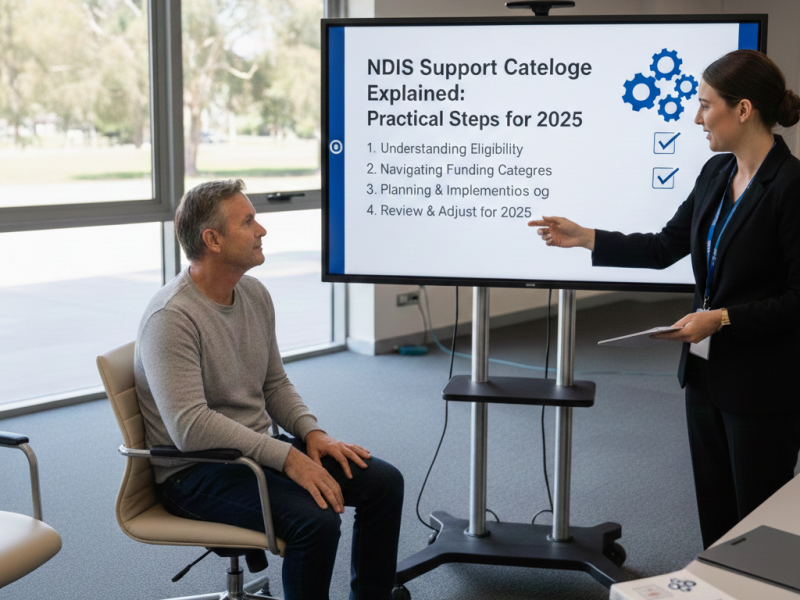Supporting a loved one with a disability can be rewarding, yet it can also be demanding. The National Disability Insurance Scheme (NDIS) funds Respite Care, also called Short Term Accommodation (STA), to give NDIS Participants a short stay away from home while their informal supporters take a planned break.
Whether it is a single night or several days; this form of support allows families and carers to rest and recharge while ensuring the Participant continues to receive safe, high-quality assistance. Used well, NDIS Respite Care and Short Term Accommodation help maintain Participant wellbeing, prevent burnout for families and carers, and strengthen long-term relationships with Registered Providers.
Eligibility Criteria for NDIS Respite Care
NDIS Respite Care is funded as Short Term Accommodation (STA). A Participant can access STA when they have an approved NDIS Plan and the support is assessed as reasonable and necessary. For Support Coordinators and Providers, that means the short stay must be directly related to the Participant’s disability, help the Participant pursue their NDIS Plan goals, and represent value for money compared with other Core Supports.
STA is commonly used when Carers and other Informal Supports need a planned break or are temporarily unavailable, and when a short stay will help the Participant build independence, try new routines, develop social skills, or prepare for future accommodation. STA must not duplicate supports delivered by mainstream systems such as hospitals or aged care, and it is not funded as general accommodation, a holiday, or a crisis housing option. The need for respite should be well documented and justified in the Participant’s NDIS Plan.
Funding amounts and frequency are set through the NDIS Planning Meeting or NDIS Plan Review, based on the Participant’s individual circumstances and evidence. The NDIS usually funds up to 28 days of STA per year, used flexibly in smaller weekends or in short blocks, often up to 14 days at a time. STA is typically claimed from the Core Supports budget, and a Participant may use flexible Core funding for STA even if a specific STA line item is not listed in the NDIS Plan.
Want to Attract More NDIS Clients?
Get expert advice on how to market your services, connect with clients, and grow your practice.
Types of NDIS Respite Care
For Support Coordinators and Providers, it helps to frame NDIS Respite Care in two clear buckets. First is Short Term Accommodation (STA), which is the NDIS term for respite away from home. Second is other Core Supports that give families a break through in-home or community supports. Using the right category keeps the NDIS Plan accurate and prevents funding issues.
Short Term Accommodation
Short Term Accommodation is a short stay away from the Participant’s usual home. An STA booking is an integrated daily package that usually includes Accommodation, Assistance with Daily Personal Activities, Meals, and agreed Activities. It can be used for planned breaks or when usual care is temporarily unavailable. Stays are often arranged in small groups with set staff ratios, or as 1:1 where the Participant’s disability requires it. Many Providers call this NDIS Respite Care, and it is the correct option when the Participant sleeps away from home.
In-Home Respite
In-Home Respite is delivered in the Participant’s home so that Carers can rest or attend other commitments. Under NDIS funding, this is usually claimed as Assistance with Daily Personal Activities from the Core budget, not as STA. It can be rostered in regular shifts or used during periods when informal supports need a break.
Community-Based Respite
Community-Based Respite focuses on time out in the community to build skills and confidence. Supports might include attending programs, recreational activities, or social groups. Under NDIS funding, this is usually claimed from Core supports such as Assistance with Social, Community and Civic Participation rather than STA, because the Participant returns home to sleep.
Centre-Based Respite
Centre-Based Respite offers structured programs in a facility with group activities and supervised support. If the Participant stays overnight, it is typically billed as Short Term Accommodation. If the Participant attends for daytime only and returns home to sleep, it is usually claimed from other Core supports, not STA.
High-Intensity or Specialist STA
Some Participants need higher support because of complex health or behavioural needs. Providers may advertise this as Specialist Respite, but in NDIS terms it is still Short Term Accommodation or other Core Supports delivered at higher intensity or with higher staff ratios. Providers should ensure workforce capability for tasks such as High Intensity Supports, Medication Management, or Positive Behaviour Support where required.
Advantages of Respite Care
NDIS Respite Care, funded as Short Term Accommodation, delivers clear benefits for Support Coordinators, Providers, Participants, and Carers. It sustains Informal Supports, builds skills, and lowers the risk of unplanned crises while keeping care safe and consistent.
Support from NDIS Registered Providers
NDIS Registered Providers meet the NDIS Practice Standards and are audited by the NDIS Commission, which gives Participants and Carers confidence in safety, quality, and safeguarding. Example: a Registered Provider supports medication administration, manages incidents, and records progress notes during the stay.
Supporting Carer Wellbeing
Planned breaks help Carers rest, reduce stress, and avoid burnout so they can continue their caring role. Example: a two night STA each month allows a parent to recover sleep and attend their own health appointments.
Enhancing Participant Independence
New settings and routines create chances to practice daily living skills and decision making. Example: a Participant cooks breakfast with support, tries public transport from the STA location, and builds confidence for future goals.
Strengthening Relationships
Time apart can reduce pressure at home and improve communication when everyone comes back together. Example: a short stay gives siblings time with parents while the Participant enjoys structured activities with peers.
Crisis Prevention
Regular, planned STA can stop care arrangements from reaching breaking point and can reduce the need for last minute emergency solutions. Example: a standing quarterly block of STA keeps Informal Supports sustainable and avoids escalation during busy school or work periods.
Overall, NDIS Respite Care and Short Term Accommodation help Support Coordinators and Providers maintain supports, help Participants work toward NDIS Plan goals, and give Carers the space they need to stay healthy and involved.
Choosing the Right Respite Care Provider
Selecting the right Provider is essential to ensuring a safe, positive, and supportive respite care experience. When considering your options, keep the following factors in mind:
NDIS Registration: Confirm that the Provider is registered with the NDIS, particularly if your funding is agency-managed by the NDIA. Registered Providers are required to meet strict quality and safety standards.
Experience and Reputation: Look for Providers with a proven track record and strong community reputation. Positive reviews, testimonials, or personal recommendations can offer valuable insights into the quality of care.
Qualified Workers: Ensure that the attending workers have relevant qualifications, experience, and ongoing training. This is especially important for Participants with complex needs who require specialised care.
Flexibility: Choose a Provider who can tailor their service to suit your preferences around routines, daily activities, cultural needs, and the desired level of independence for the Participant.
Safety and Quality Standards: Check for clear safeguarding procedures, incident reporting processes, and evidence that the Provider follows NDIS Practice Standards. This helps ensure consistent, high-quality care.
Effective Communication: A good Provider will involve you in planning, communicate clearly, and create a welcoming environment where the Participant feels safe, respected, and supported.
Before deciding, take the time to meet with potential Providers, ask questions about their services, and visit their facilities if possible. This can help you feel more confident and informed in your choice.
How to add STA/Respite Care to an NDIS Plan
Support Coordinators and other Providers can make Short Term Accommodation requests clear and easy for the NDIS Planner by following these steps.
Define the need: Write a short summary of why a short stay is required, for example sustainability of Informal Supports, temporary unavailability of usual supports, or a goal-linked trial of new routines. Keep the focus on disability-related needs, not a holiday or general accommodation.
Link to NDIS Plan goals: Show how STA will help the Participant work toward goals such as independence, community participation, daily living skills, or readiness for future living.
Gather supporting evidence: Include a Carer Statement about fatigue or sustainability, recent allied health or clinical reports, a simple support profile, and a brief risk and safeguards summary covering health needs, behaviour supports, and medication.
Provide a clear, costed quote: Attach an STA quote that lists dates, number of nights, staff-to-Participant ratio, daily price, and what is included. The STA day price should bundle Accommodation, Assistance with Daily Personal Activities, Meals, and agreed Activities. Add any Additional 1:1 hours if required, plus transport and cancellation terms.
Explain value for money: In one or two sentences, compare STA with other Core Supports and state why a short stay is the most suitable and cost-effective option for the outcomes sought.
Request funding at the NDIS Planning Meeting or NDIS Plan Review: Ask for STA under Core Supports and propose how days will be used, for example a weekend each month or short blocks. The NDIS usually funds up to 28 days of STA per year, used flexibly to suit the Participant.
After approval: Check that STA appears in the Core budget or confirm that flexible Core funding is sufficient. Create a Service Booking if the NDIS Plan is NDIA Managed. Agree a simple Service Agreement, confirm the schedule, and set up progress notes so outcomes can be reported at the next NDIS Plan Review.
Remember to review the NDIS Plan annually to ensure it is inclusive of updated goals or support needs, and reflective of any changes in the Participant’s situation. This helps ensure that STA/Respite Care continues to meet the Participant’s evolving needs.
Referrals Start With Reputation – We’ll Help You Build Both
From networking tips to service refinement, we guide NDIS providers toward lasting impact.
Conclusion
NDIS Respite Care and Short Term Accommodation are vital supports that help sustain both Participants and their informal carers. Whether through a night away, in-home assistance, or structured programs in the community, respite care offers more than just a break. It promotes wellbeing, builds independence, prevents carer burnout, and supports long-term care stability. If you or someone you care for could benefit from NDIS-funded respite care, start by reviewing your current NDIS Plan. Speak with your NDIS planner or support coordinator about including respite as a reasonable and necessary support. You have the right to request help that protects your health, strengthens your support network, and brings balance to your NDIS journey.
FAQs
1) What is Short Term Accommodation (STA), including respite, and who can access it?
Short Term Accommodation (STA), including respite, is NDIS funding for a short stay away from the Participant’s usual home. An STA day is an integrated package that usually includes Accommodation, Assistance with Daily Personal Activities, Meals, and agreed Activities. It is used when Informal Supports need a planned break or when usual arrangements are temporarily unavailable. A Participant can access STA when it is reasonable and necessary, relates to disability support needs, and helps pursue NDIS Plan goals. STA is not a holiday or general accommodation.
2) Does the NDIS fund Short Term Accommodation and respite services?
Yes. STA is funded from the Core budget and maps to Registration Group 0115, Assistance with Daily Life Tasks in a Group or Shared Living Arrangement. Funding is approved when STA is reasonable and necessary and linked to the Participant’s NDIS Plan goals. Providers normally claim one per-day STA line item that bundles support, accommodation, meals, and activities, using group ratios or 1:1 where required. If the NDIS Plan is NDIA Managed the Provider must be NDIS Registered. Plan Managed and Self Managed Participants may use an unregistered provider unless restricted supports are involved.
3) How many days of Short Term Accommodation can a Participant access?
The NDIS usually funds up to 28 days of STA per year. Days can be used flexibly, for example a weekend each month or blocks of up to 14 days. The amount and pattern of use are set in the NDIS Planning Meeting or NDIS Plan Review and should reflect goals, evidence, and value for money.
4) How can Participants include Short Term Accommodation in their NDIS Plan?
Support Coordinators and Providers should present a clear, goal-linked request at the NDIS Planning Meeting or NDIS Plan Review.
- Define the need and show the impact on Informal Supports.
- Link STA to specific NDIS Plan goals such as independence, daily living skills, or community participation.
- Attach evidence such as a Carer Statement and recent clinical or allied health reports.
- Provide a costed STA quote with dates, number of nights, staff-to-Participant ratio, daily price, inclusions, any Additional 1:1 hours, transport, and Short Notice Cancellation terms.
- Explain value for money compared with other Core Supports.
After approval, confirm the budget, set a Service Booking if the NDIS Plan is NDIA Managed, agree a Service Agreement, and record outcomes to support the next review.


